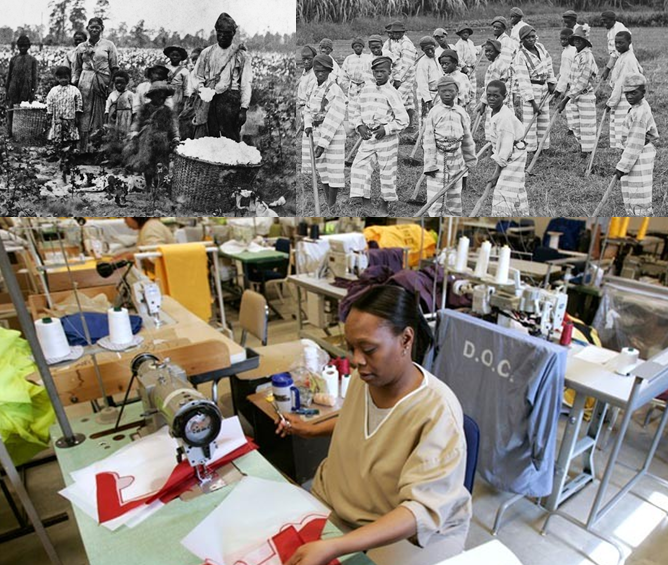
Why We Should End Slavery.
We should end slavery in America because slavery is wrong. I’m confident that most Americans will agree with that premise without desiring further explication. For those that do want a more articulate argument on that point, I’ll try to make it in this essay. Some Americans might respond to this idea by saying “…but American slavery is over.” Unfortunately, that isn’t true. This incredibly cruel institution that has continuously scarred our collective psyche since its inception remains alive and vibrant. With the passing of the 13th amendment, we modified the preconditions for slavery but we did not successfully eliminate the scourge entirely. There’s an exception clause in the 13th amendment that allows people convicted of a crime to be enslaved and compelled to labor. I’m heretofore calling for an end to that exception clause. We should change the wording of the 13th amendment from this:
“Neither slavery nor involuntary servitude, except as a punishment for a crime whereof the party shall have been duly convicted, shall exist within the United States, or any place subject to their jurisdiction.”
to this:
“Neither slavery nor involuntary servitude shall exist within the United States, or any place subject to their jurisdiction.”
This change is simple, elegant, and I believe it is in full concert with our most deeply held national values. Here I identify what will probably be some of the most common objections to this idea and offer a counterpoint to each of them. I will also describe an imaginable way to achieve this goal.
Objection #1 – It’s unnecessary. We don’t need to do this at all. We can get the prisons to treat prisoners better.
A predicable outcome of eliminating the slavery exemption will be the vastly improved treatment of prisoners. I strongly agree with the last part of this objection and see it as parallel and complementary to the aims of my endorsement. Removing the slavery exemption from the constitution will go as far, or further, in improving the daily lives of prisoners than any other step I can presently imagine. To say that changing the language of the 13th amendment is unnecessary, is to say that ongoing utilization of involuntary servitude is not among the most important issues facing the United States today. One might say that we don’t need to end slavery because we already have. In that case, see the first paragraph of this article. One might say that gross wealth inequality, the federal deficit, illegal immigration, climate change, disproportionate shooting deaths, globalism, socialism, fascism and/or popular inquisition of free speech are all more pressing and more imminently threatening than the continuance of involuntary servitude. I wouldn’t disagree with that argument at its face value but is it fair to say that we as a nation are only ever working on one issue at a time? Is it more correct to say that we the people are dealing with and talking about many issues at any one time? There are multiple measures on most ballots that come before us as voters. How much time will it take away from even the most reluctant American to join this cause? It would probably take less than two minutes to sign a petition at a signature collection table outside a local grocer and less than 30 seconds to read the amendment on an upcoming ballot and fill in your vote. Many people will give more time than that to this cause but it will take a relatively small percentage of the electorate to get the job done. For most of us, it will take less attention and concern than it has taken to read this article. In exchange, we are working as a unit to end slavery once and for all. The cost/benefit ratio in this case couldn’t be smaller. It’s worth the effort. We can speak out against slavery and at the same time make our arguments for any other issue that we care about without much inconvenience. To say that making this change is unnecessary right now, is to say that ending slavery is not very important right now, in so many words. I implore the reader; add the profiteering on the backs of slaves to your list of healthy grievances with our republic. This issue deserves to be very near the top of those lists indeed.

Objection #2 – Modern prison labor isn’t as bad as the old type of slavery.
I think the objector in this case is imagining something like a scene from before the civil war in which a woman that had the audacity to learn how to read without her master’s permission was whipped and beaten bloody in front of her entirely family to serve as a warning against literacy and is comparing that scene to one in which inmates walk the yard, play dominoes, rap, and do pushups whilst any act of bloody violence is usually perpetrated by another inmate and not the guards. The objector might also be thinking that, in the old system of slavery, slaves were almost always unpaid, their only compensation being in the form of food, shelter, and material for clothing, and comparing that to the fact that modern slaves receive food, shelter, clothing, and monetary compensation. To the objector, that might seem like a tiny amount of progress. I would then, at that specific level of analysis, agree that modern slavery isn’t as bad as the old type. However, a new question can be raised; what should the period of incarceration do to or do for the prisoner? We probably agree that imprisonment should be first and foremost a punishment for crimes committed. That said, should imprisonment begin and end as only a punishment or should it be something more? Should imprisonment actually help the person learn from their mistakes and learn how to avoid those mistakes in the future? According to the U.S. Department of Justice, 68% of released prisoners are arrested for a new crime within 3 years and 77% are arrested within 5 years. Compare that to the Norwegian recidivism rate totaling 20%, according to the Norwegian Correctional Department. Our country isn’t the same as Norway. Our culture isn’t the same as the Norwegian’s but we are all equally human. We have the same basic psychological constitutions. On average, our prisoners probably have the same ability to learn and improve themselves. In light of these ideas, the continued argument that “We aren’t Norway.” sounds exactly like “I don’t want to learn from Norwegians.” to my ears. The psychobiological commonalities we share with the Norwegian people far outweigh the inherited cultural differences. We can learn from the Norwegians and we should want to. At this level of analysis, neither old slavery nor mass incarceration have within their grounding philosophies the intention to improve the lot of the afflicted. Both systems are intended to mentally and emotionally subjugate the afflicted currently and perpetually. At this level of analysis, modern slavery is no different than the old institution.

Objection #3 – It won’t happen. It’s too hard. It’s politically impossible.
I imagine that this argument will be very common but it doesn’t hold much weight. Everything’s impossible until it happens.
Objection #4 – The work that the prisoners do is important for giving meaning to their daily lives and improving their psychological development.
If this objection is offered, this objector is more likely a philosophical teammate than an opponent. We should move towards the Norwegian system of criminal rehabilitation. It provides much more meaning and psychological development for people than is imaginable under our current system.
The way forward is to get this change on the ballot. I’m personally looking for groups that are already making this effort. If you are in one of those groups, please reach out to me. I’m confident that the vast majority of Americans will support this cause. Ending slavery is a noble aim in and of itself. I think it’s worth a second thought to say the least. Today’s prison labor system is not like slavery. It’s not similar to slavery. The 13th amendment, as it is written, is explicit. Modern prison labor is slavery, exactly. We should end this practice now and offer these people more dignity and more liberty. Most of us think that slavery is already over. Let’s get our documents caught up with our attitudes. We, and the entire world, should look to the Norwegian criminal rehabilitation system for ideas. Their system works for a reason. In this trying time of increasing polarization, it’s nice to have an idea we can agree on. I think this is that idea.


